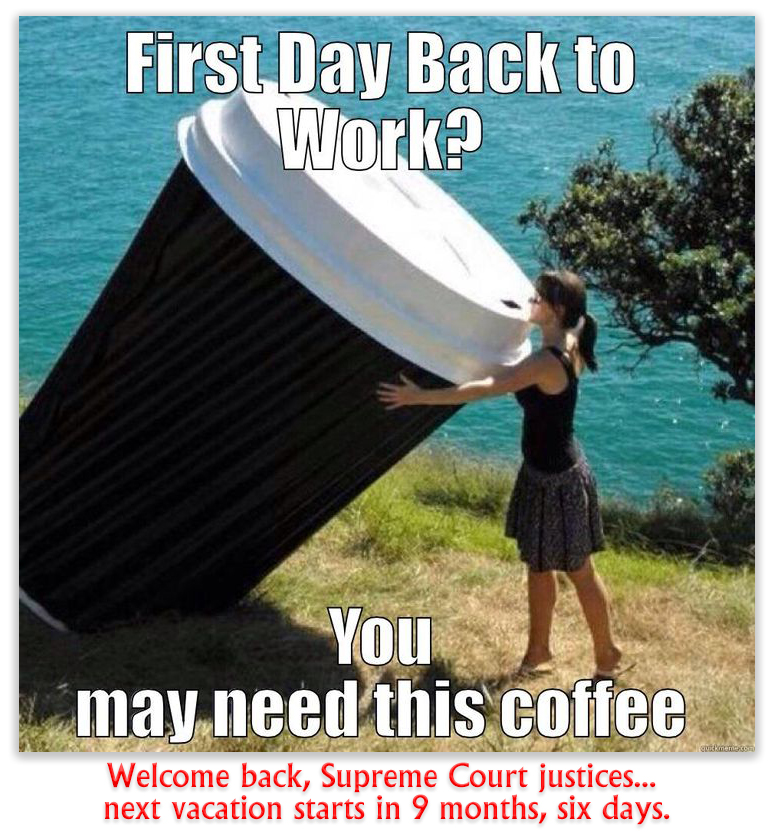We post news and comment on federal criminal justice issues, focused primarily on trial and post-conviction matters, legislative initiatives, and sentencing issues.

SEE YOU IN SEPTEMBER… SUPREME COURT GETS BACK TO WORK
Although the opening session of the Supreme Court is always the First Monday in October, the eight justices return to work today for the annual “long conference,” at which they consider the mass of petitions for certiorari, requests from unsuccessful lower-court litigants for review of their cases, that build up over the Court’s three-month vacation.
 The Court hears about 70 cases out of the roughly 7,000 petitions for review it receives each term. It has already granted certiorari to hear 38 cases and will add more to the schedule over the next few months. Thirteen of those cases raise criminal law issues. This is about average: Between 25% to 33% of cases decided by the court every year are criminal-law-related. But a few of this term’s decisions could have huge implications.
The Court hears about 70 cases out of the roughly 7,000 petitions for review it receives each term. It has already granted certiorari to hear 38 cases and will add more to the schedule over the next few months. Thirteen of those cases raise criminal law issues. This is about average: Between 25% to 33% of cases decided by the court every year are criminal-law-related. But a few of this term’s decisions could have huge implications.
First, next month the court will consider what constitute the “generic” elements of the common law “robbery” and “burglary” offenses. The Armed Career Criminal Act “crime of violence” definition includes “burglary” as a named offense, and also any crime that “has as an element the use… or threatened use of physical force.” That normally includes robbery.
The exact “generic” definitions of burglary or robbery has split lower circuits.
In Gamble v. United States, the court will consider whether to overrule the “separate sovereigns” exception to double jeopardy. The 5th Amendment provides that “no person shall… be subject for the same offence to be twice put in jeopardy of life and limb.” The common understanding of this is that a person may not be tried twice for the same offense. But the Supreme Court has ruled for well over a century that the clause allows “separate sovereigns” to each try a single defendant for what sure sounds like the “same offense.” A state may prosecute someone for the same crime that the federal government has already tried the person for, and the other way around.
 There is no lower-court split on this question, but scholars have long criticized this “separate sovereigns” exception to the double jeopardy clause as being without support.
There is no lower-court split on this question, but scholars have long criticized this “separate sovereigns” exception to the double jeopardy clause as being without support.
Another case, Timbs v. Indiana, addresses the “no excessive fines” provision in the 8th Amendment. When Tyson Timbs was convicted in Indiana of selling four grams of heroin, the state forfeited his $42,000 Land Rover because it had been used to transport the drugs. The Indiana Supreme Court refused to “impose federal obligations on the State that the federal government itself has not mandated.” A persistent split on the question, involving at least 18 states’ courts and two federal courts of appeals, led to a grant of certiorari.
Other criminal cases include Gundy v. United States, to be argued next week, that asks whether Congress’ delegation of authority to the attorney general to set sex-offender regulations, including deciding whether to retroactively apply the criminal statute, violate the Constitution’s “nondelegation” principle?
The Court’s decision to hear Gundy case came as a surprise. The Justices have not invalidated a congressional delegation in over 80 years, and all federal appellate courts addressing the issue have concluded that the delegation was proper. At least four Justices, the number needed to grant certiorari, however, thought the issue worth considering, clearing the way for a potential major assault on the modern administrative state, which is shaped by countless congressional delegations of authority to agencies.
On the merits, Mr. Gundy has a strong claim. For a delegation to be proper, Congress must provide an “intelligible principle” to guide the delegated decision, which as Chief Justice John Marshall stated in 1825 should merely “fill up the details” of a law’s application. With SORNA, Congress simply directed the attorney general to decide the retroactivity question — hardly a detail, as it affected half a million people and has required significant federal prosecutorial resources.
Two others include Nielsen v. Preap, asking whether a criminal alien exempt from otherwise mandatory detention if, after the person is released from criminal custody, the Department of Homeland Security does not immediately take the person into custody, and Garza v. Idaho, asking whether prejudice is presumed when a defense lawyer was instructed by the defendant to file an appeal but the lawyer did not file an appeal because the plea agreement contained an appeal waiver?

Of course, the big Supreme Court story this week is whether Judge Brett Kavanaugh’s confirmation as the ninth Supreme Court justice will occur, or whether he will be shot down over claims he groped a girl as a drunken teenager 30 years ago. With a second accuser – albeit one with a shaky recall about an incident when Kavanaugh was a college freshman – reportedly coming forward, the nomination is looking shakier than ever.
SCOTUSBlog.com, Criminal cases in the October 2018 term: A law professor’s dream (Sept. 18, 2018)
Sentencing Law and Policy, Strange Bedfellows at the Supreme Court (Sept. 17, 2018)
– Thomas L. Root

